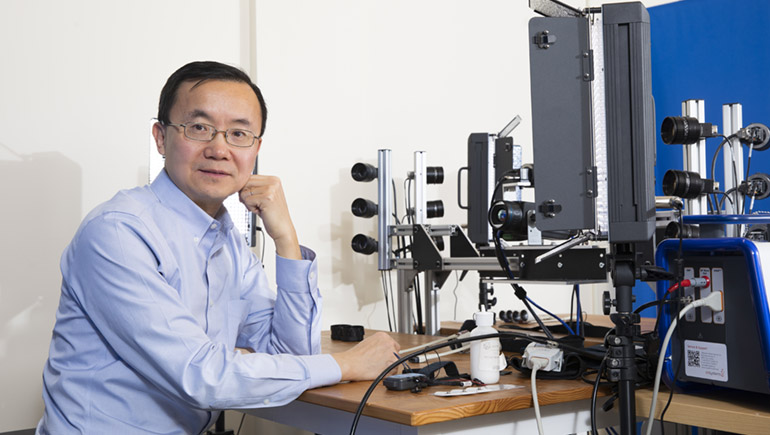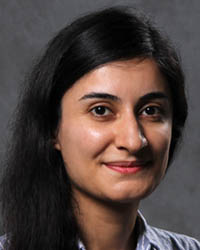Computer Science Department celebrates research, new faculty for 2020-21

The Department of Computer Science at the Thomas J. Watson College of Engineering and Applied Science has had a productive academic year in 2020-21, despite the ongoing challenges of the COVID-19 pandemic.
Total CS enrollment for the spring 2021 semester was 1,000 (578 undergraduates, 66 dual-degree program students, 279 master’s students, 77 PhD students). The CS Class of 2021 included 118 bachelor’s degrees, 149 master’s degrees and nine PhDs.
New associate chair
Professor Dmitry Ponomarev, PhD ’03, was appointed the associate chair of the Computer Science Department in September 2020.
Ponomarev has been part of the Binghamton faculty since 2003. His research interests are in computer architecture, systems security, energy-aware systems and parallel discrete event simulation. His research has been funded by the National Science Foundation, the Air Force Research Laborator and the Air Force Office of Scientific Research. He is a recipient of SUNY Chancellor’s Award for Excellence in Scholarship and Creative Activities.
NSF CAREER Awards
Three assistant professors received National Science Foundation CAREER Awards in 2021. This follows the success of another three faculty members with NSF CAREER Awards last year.The CAREER Award supports early-career faculty who have the potential to serve as academic role models in research and education.
Jeremy Blackburn received a five-year, $517,484 grant for his project “Towards a Data-Driven Understanding of Online Sentiment.” The goal is to devise ways to make online content easier to gather and sort, particularly from emerging social media platforms.
Aravind Prakash received a five-year, $499,893 grant for “Binary-Level Security via ABI-Centric Semantic Inference.” The funding will expand his research into binary analysis techniques to understand software where the source code is unavailable in order to identify potential holes that could let hackers in.
Mo Sha received a five-year, $500,000 grant for “Advancing Network Configuration and Runtime Adaptation Methods for Industrial Wireless Sensor-Actuator Networks.” He is studying more efficient ways to run industrial wireless networks in settings such as factories and warehouses, utilizing leading-edge technology like machine learning.
More research funding
Assistant Professor Jeremy Blackburn (PI): “Collaborative Research: SaTC: CORE: Small: Detecting Accounts Involved in Influence Campaigns on Social Media,” NSF, $220,000.
Blackburn (PI): “A Data-driven Measurement Study of the Use of Preprints in the Realm of Health-related Mis- and Dis-information,” Media Ecosystems Analysis Group/Bill and Melinda Gates Foundation, $35,712.
Associate Professor Kenneth Chiu (PI): “SRA - Performance Measurement, Analysis, and Tuning of Seismic and Machine Learning Workloads,” TOTAL E&P Research & Technology USA, LLC, $94,408.
Assistant Professor Weiying Dai (PI): “Basal Forebrain connections to the heart and mind in healthy aging,” National Institute on Aging (subcontract from Cornell University’s NIH contract), $125,982.
Professor Kartik Gopalan (PI): “Improving Performance and Functionality of Virtual Machine Templating,” ITRI International Incorporated, $50,000.
Professor Kyoung-Don Kang (PI): “CNS Core: Small: Toward Real-Time Stream Processing in Edge Devices,” NSF, $500,000.
Associate Professor Yao Liu (PI): “Collaborative Research: CNS Core: Small: From Capture to Consumption: System Challenges in Pervasive 360-Degree Video Sharing,” NSF, $249,999.
Professor Dmitry Ponomarev (PI) and Professor Yu (David ) Liu (co-PI): “Collaborative Research: SaTC: CORE: Medium: Leakage-free Isolated Execution: Architectures and Security Models”, NSF, $694,000.
Assistant Professor Seunghee Shin (PI): “Research on CPU vulnerability detection and validation,” Korea University, $83,362.
Associate Professor Guanhua Yan (PI) and Associate Professor Ping Yang (co-PI): “Real-Time Detection of Advanced Malware Attacks with Ensembles of Graph Neural Networks,” SUNY-IBM AI Research Alliance, $100,000.
Associate Professor Lei Yu (co-PI): “Asynchronous Distributed and Adaptive Parameter Tuning (ADAPT) for Hybrid PV Plants,” Department of Energy, $2,579,801. (Yu’s share: 25%.)
Yu (co-PI): “Stability Impact Analysis of the New York Power Grid with High Penetration of Inverter Based Distributed Energy Resources,” New York State Energy Research and Development Authority (NYSERDA), $400,000. (Yu’s share: 50%).
Yu (PI): “Multi-Physics Numerical Methods Using Reinforcement Learning”, DARPA (subcontract from General Electrics’ DARPA contract), $210,951.
Assistant Professor Shiqi Zhang (PI): “Human-AI Interaction for Riders of Autonomous Vehicles,” Ford Motor Company, $100,000.
Awards and recognitions
Two computer science faculty members were honored with SUNY Chancellor’s Awards for Excellence this spring: Associate Professor Ping Yang (Excellence in Faculty Service) and lecturer Steven Moore (Excellence in Teaching).
Two from CS also were honored at the Watson College Recognition Awards: Assistant Professor Aravind Prakash (Early-Stage Distinguished Research) and graduate administrative assistant Tara Brentari (Outstanding Staff Service).
The National Academy of Inventors (NAI) named Professor Lijun Yin among the 61 academic inventors in its 2021 class of senior members.
Meet the new faculty
Two new assistant professors joined the CS Department in 2020-21.
Hoda Naghibijouybari earned her PhD from the University of California at Riverside. Her primary research interests are computer architecture and security. Her current research focuses on architecture support for security, microarchitectural attacks, GPU security and heterogeneous systems. Her research has resulted in the discovery of new attacks that have been disclosed to GPU companies, and it has received coverage from technical news outlets.
Sujoy Sikdar earned his PhD from Rensselaer Polytechnic Institute. He has broad interests across artificial intelligence, mechanism design, problems at the intersection of computer science and microeconomics, machine learning and computational social science. His research focuses on algorithmic decision-making in the allocation of resources, with an eye at learning and faithfully representing preferences.
Alumni news
Among the newest CS alumni is Gissella Bejarano, MS ‘17, PhD ’21. The Peru native first heard of Binghamton University when the Fulbright Program offered to help fund her master’s degree, and she stayed at Watson for her doctorate. Her research posited how machine learning could be applied to smart cities, particularly water and energy consumption as well as predicting the resolution times of emergency events.
After five years working at LinkedIn and Intuit, Mudit Goel ’12 has returned to his native Delhi, India, and founded Coding Elements. The school started in 2017 with just three classrooms, but last year, the government of India selected it to provide courses to 2 million students in grades 7 and up at 6,000 schools.



